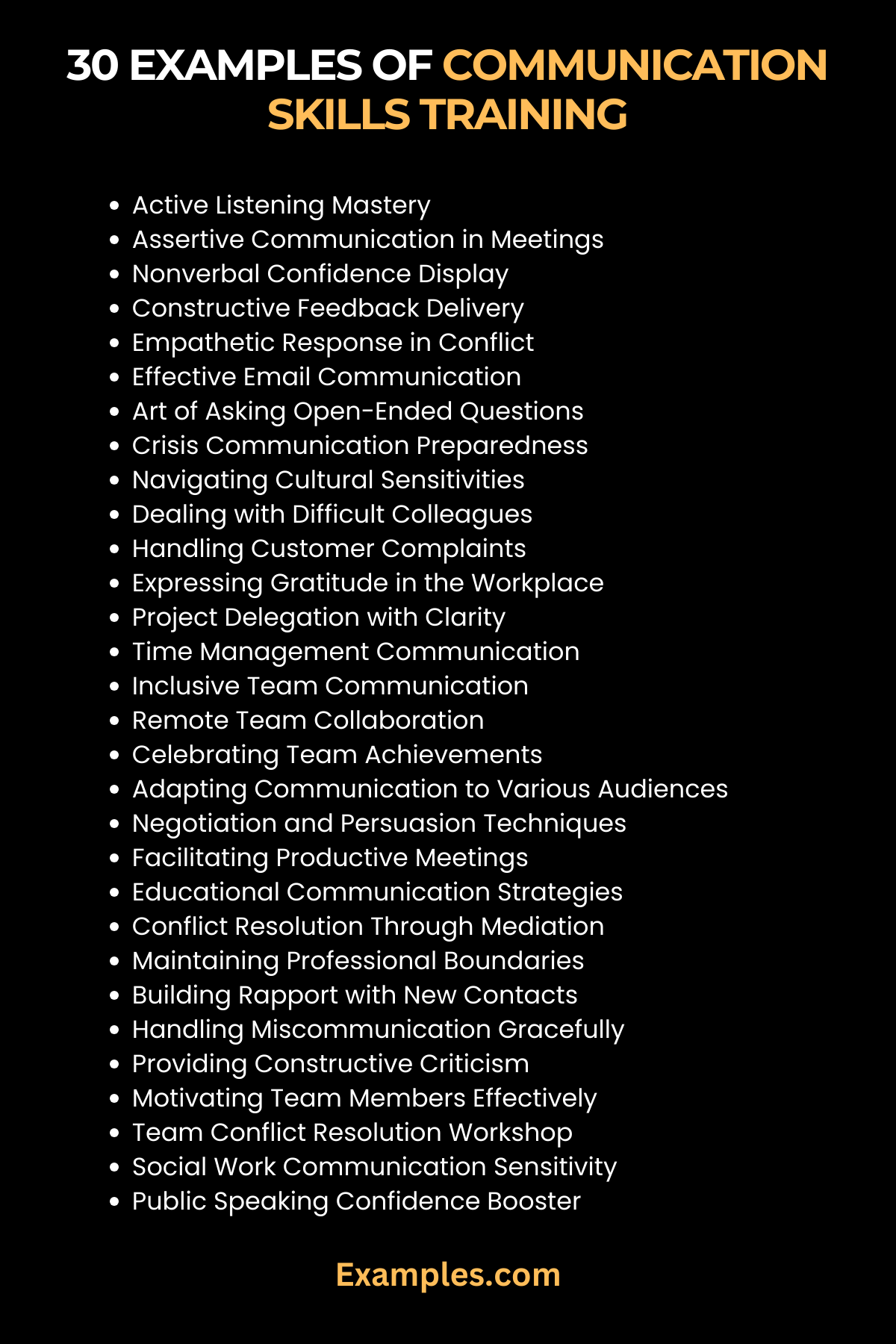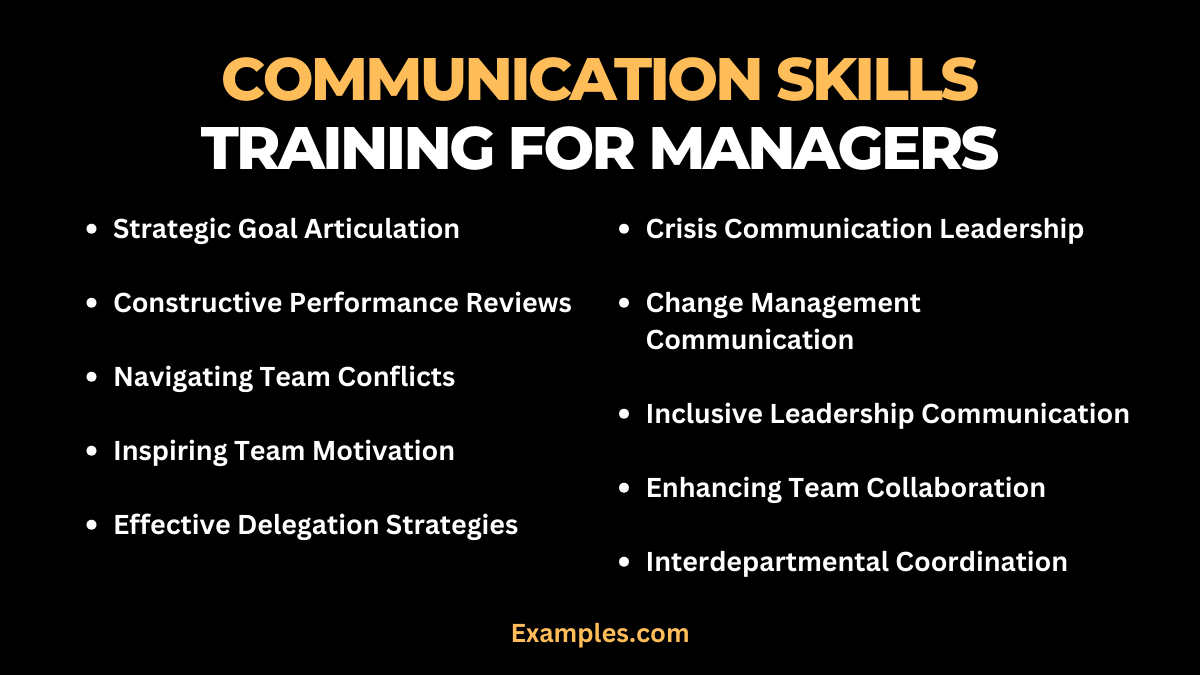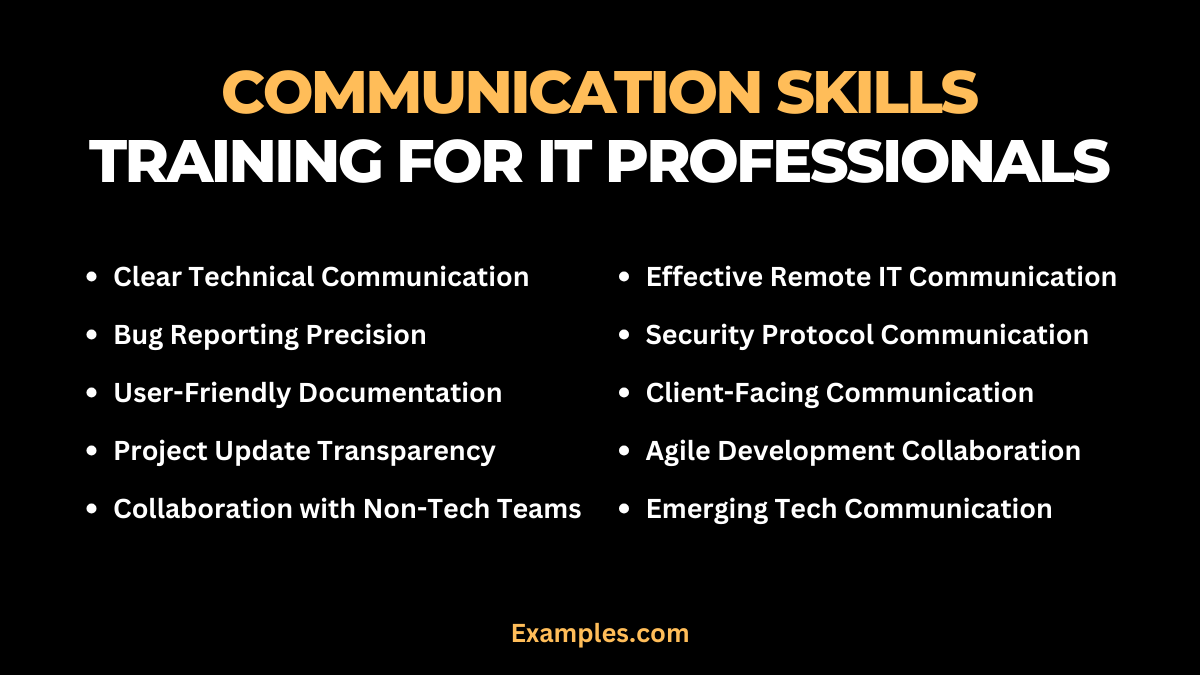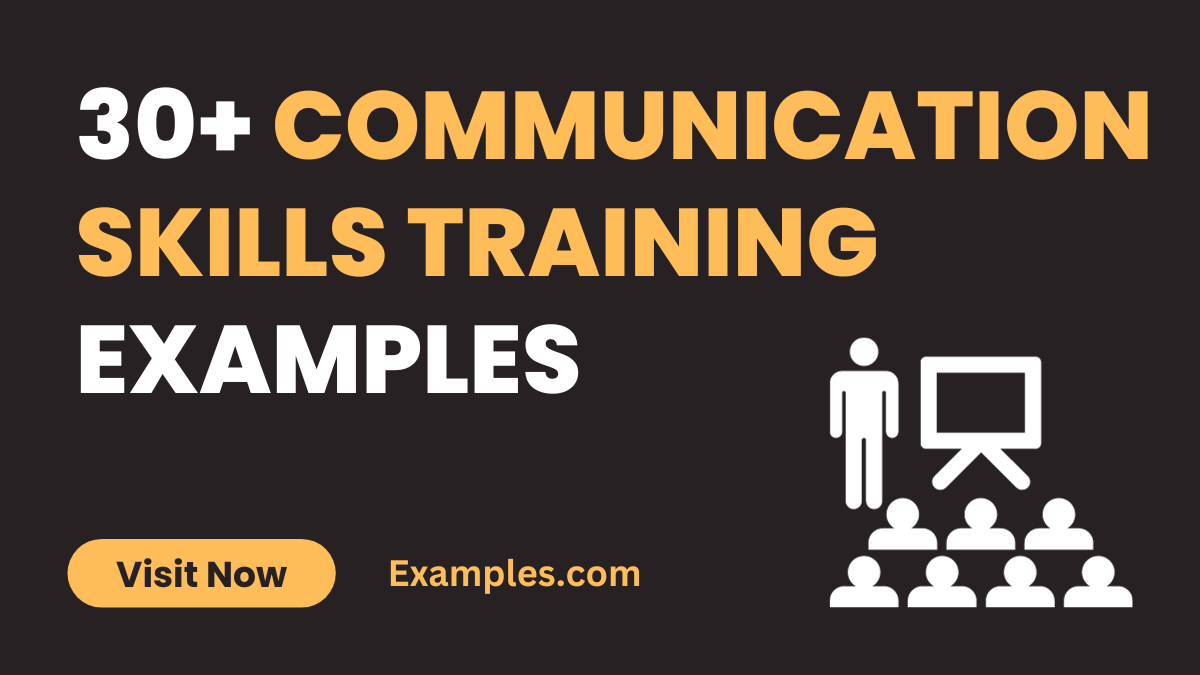29+ Communication Skills Training Examples
Embark on a transformative journey with our Communication Skills Training guide. Dive deep into the intricacies of effective communication, enriched with practical Communication Examples. Explore proven strategies, enhance your verbal prowess, and master the art of nonverbal cues. This comprehensive resource is your gateway to honing communication skills that empower personal and professional success. Elevate your interactions, build rapport, and unleash the potential of impactful communication in diverse settings.
30 Examples of Communication Skills Training
Enhance your communication prowess with our curated list of Communication Skills Training Examples. Each example is a valuable lesson, designed to improve your verbal, nonverbal, and interpersonal skills. Explore diverse scenarios and learn how to navigate conversations effectively, whether in the workplace, classroom, or social settings.

- Active Listening Mastery:
- Boldly affirm, “I understand your perspective; tell me more,” fostering engaged and attentive dialogue.
- Assertive Communication in Meetings:
- Exemplify assertiveness with, “I appreciate your input, and I’d like to share my thoughts on this matter.”
- Nonverbal Confidence Display:
- Convey confidence through posture, maintaining eye contact, and offering a firm handshake.
- Constructive Feedback Delivery:
- Skilfully provide feedback, saying, “Your effort is commendable, and here’s a suggestion for improvement.”
- Empathetic Response in Conflict:
- Show empathy by saying, “I understand this situation is challenging for you; let’s find a solution together.”
- Effective Email Communication:
- Craft concise and clear emails, ensuring your message is easily understood by the recipient.
- Art of Asking Open-Ended Questions:
- Encourage dialogue with questions like, “Can you share more about your experience with this project?”
- Crisis Communication Preparedness:
- Be ready for crises, saying, “In the face of challenges, clear communication is crucial; let’s address this together.”
- Navigating Cultural Sensitivities:
- Demonstrate cultural awareness by saying, “I appreciate and respect our diverse perspectives in this global team.”
- Dealing with Difficult Colleagues:
- Tactfully address issues, saying, “Let’s discuss our concerns and find common ground for collaboration.”
- Handling Customer Complaints:
- Show empathy in customer service, saying, “I understand your frustration; let’s work together to resolve this issue.”
- Expressing Gratitude in the Workplace:
- Foster positivity by saying, “Thank you for your contribution; your efforts do not go unnoticed.”
- Project Delegation with Clarity:
- Delegate tasks effectively, saying, “Your expertise makes you ideal for this task; I trust you to handle it.”
- Time Management Communication:
- Communicate time constraints clearly, saying, “I’m on a tight schedule; can we discuss this in a brief meeting later?”
- Inclusive Team Communication:
- Promote inclusivity, saying, “Each team member’s input is valued; let’s ensure everyone is heard.”
- Remote Team Collaboration:
- Facilitate virtual collaboration, saying, “Let’s schedule a video call to discuss and align on our goals.”
- Celebrating Team Achievements:
- Boost morale, saying, “Congratulations on the successful project; your teamwork made it possible!”
- Adapting Communication to Various Audiences:
- Tailor your message, saying, “Let’s adjust our approach for this audience to ensure effective communication.”
- Negotiation and Persuasion Techniques:
- Navigate negotiations, saying, “Here are the benefits of our proposal; let’s find common ground for agreement.”
- Facilitating Productive Meetings:
- Lead engaging meetings, saying, “Let’s stick to the agenda to ensure a focused and productive discussion.”
- Educational Communication Strategies:
- Enhance teaching methods, saying, “Engaging students through interactive discussions fosters a deeper understanding.”
- Conflict Resolution Through Mediation:
- Act as a mediator, saying, “Let’s find a compromise that addresses both parties’ concerns in this conflict.”
- Maintaining Professional Boundaries:
- Assert professional boundaries, saying, “I appreciate friendliness, but let’s maintain a professional tone in communication.”
- Building Rapport with New Contacts:
- Initiate connections, saying, “I’m excited to collaborate; let’s schedule a call to discuss our shared interests.”
- Handling Miscommunication Gracefully:
- Clarify misunderstandings, saying, “I see where the confusion arose; let me clarify my intended message.”
- Providing Constructive Criticism:
- Offer feedback, saying, “Your effort is evident; here are some suggestions for improvement to elevate your work.”
- Motivating Team Members Effectively:
- Inspire motivation, saying, “Your dedication is inspiring; let’s continue working towards our shared goals.”
- Team Conflict Resolution Workshop:
- Host a workshop, saying, “Let’s engage in open dialogue to address any team conflicts and find resolutions.”
- Social Work Communication Sensitivity:
- Demonstrate empathy, saying, “Your experiences matter; let’s work together to support your well-being.”
- Public Speaking Confidence Booster:
- Build confidence, saying, “By rehearsing key points, your message will resonate with the audience during the presentation.”
Communication Skills Training for Managers
Unlock managerial success with our tailored training. Elevate leadership communication, navigate team dynamics, and master strategies for effective collaboration in a corporate setting.

- Strategic Goal Articulation:
- Boldly declare, “Our strategic objective is clear: to enhance productivity and foster innovation among our teams.”
- Constructive Performance Reviews:
- Provide feedback adeptly, saying, “Your achievements are commendable; let’s discuss areas for growth in our upcoming review.”
- Navigating Team Conflicts:
- Resolve conflicts decisively, saying, “Let’s address the team dynamics affecting collaboration and find resolutions together.”
- Inspiring Team Motivation:
- Ignite motivation, saying, “Your dedication is inspiring; let’s channel this energy towards achieving our collective goals.”
- Effective Delegation Strategies:
- Delegate with clarity, saying, “Your expertise aligns perfectly; I trust you to take charge of this critical task.”
- Crisis Communication Leadership:
- Lead in crises, saying, “During challenging times, clear communication is paramount; let’s ensure our teams are well-informed.”
- Change Management Communication:
- Navigate change adeptly, saying, “Let’s communicate the benefits and the path forward during this transformative phase.”
- Inclusive Leadership Communication:
- Promote inclusivity, saying, “Every team member’s voice matters; let’s ensure everyone feels heard and valued.”
- Enhancing Team Collaboration:
- Foster collaboration, saying, “Our success hinges on teamwork; let’s amplify our communication to strengthen collaboration.”
- Interdepartmental Coordination:
- Coordinate seamlessly, saying, “In our collaborative efforts, clear communication across departments is key; let’s align our strategies.”
Communication Skills Training for IT Professionals
Empower IT professionals with specialized communication training. Bridge the gap between technical expertise and effective collaboration, ensuring seamless interactions in the fast-paced IT environment.

- Clear Technical Communication:
- Articulate clearly, saying, “Simplify technical jargon to ensure our stakeholders grasp the significance of our IT initiatives.”
- Bug Reporting Precision:
- Report bugs effectively, saying, “Your detailed bug report allows our developers to address issues promptly; keep up the precise reporting.”
- User-Friendly Documentation:
- Craft accessible documentation, saying, “Let’s ensure our user manuals are intuitive and provide a seamless experience for our users.”
- Project Update Transparency:
- Communicate project updates transparently, saying, “In our weekly updates, let’s provide a comprehensive overview of project progress.”
- Collaboration with Non-Tech Teams:
- Bridge gaps with non-tech teams, saying, “Let’s translate our technical achievements into accessible language for cross-team collaboration.”
- Effective Remote IT Communication:
- Navigate remote collaboration, saying, “Utilize virtual tools effectively to maintain seamless communication within our dispersed IT teams.”
- Security Protocol Communication:
- Communicate security protocols clearly, saying, “Your concise guidelines ensure our data remains secure; let’s reinforce these communication standards.”
- Client-Facing Communication:
- Engage clients effectively, saying, “Let’s tailor our communication to address client concerns and ensure satisfaction with our IT solutions.”
- Agile Development Collaboration:
- Embrace agility, saying, “In our sprints, transparent communication is vital; let’s align our efforts for efficient development cycles.”
- Emerging Tech Communication:
- Navigate emerging tech discussions, saying, “In our tech talks, let’s break down complex concepts for a broader understanding among team members.
How do You Train Communication Skills?
Mastering communication skills involves a multifaceted approach, blending theory and practical techniques. Follow these steps for effective communication skills training:
- Self-Assessment:
- Begin by evaluating your current communication strengths and weaknesses. Recognize areas for improvement.
- Identify Specific Goals:
- Define clear objectives. Whether enhancing public speaking or active listening, pinpoint the skills you want to cultivate.
- Interactive Workshops:
- Participate in workshops providing hands-on exercises, fostering a dynamic learning environment.
- Role-Playing Scenarios:
- Engage in realistic role-play to simulate various communication scenarios. This hones adaptive communication skills.
- Feedback Mechanism:
- Establish a constructive feedback loop. Evaluate performance regularly and incorporate suggestions for improvement.
- Utilize Technology:
- Leverage communication apps and platforms for virtual training. Enhance digital communication proficiency.
- Continuous Learning:
- Stay updated on communication trends and techniques. Attend seminars, webinars, and read relevant literature.
- Mentorship Programs:
- Participate in mentorship programs for personalized guidance. Learn from experienced communicators.
- Networking Opportunities:
- Expand your network. Engage in conversations with diverse individuals to practice adaptive communication.
- Recorded Practice Sessions:
- Record and review your communication sessions. This offers valuable insights into body language, tone, and articulation.
What Types of Training are Needed for Communication Skills?
Tailoring communication skills training to specific needs ensures comprehensive development. Explore diverse training types:
- Verbal Communication Workshops:
- Focus on articulation, clarity, and effective verbal expression in various settings.
- Nonverbal Communication Seminars:
- Understand the impact of body language, gestures, and facial expressions on effective communication.
- Active Listening Training:
- Enhance listening skills through specialized exercises and workshops.
- Conflict Resolution Programs:
- Learn techniques to navigate and resolve conflicts positively in both personal and professional spheres.
- Public Speaking Courses:
- Build confidence and refine public speaking skills through structured courses and practice sessions.
- Interpersonal Communication Training:
- Develop skills for building rapport, empathy, and positive relationships with others.
- Customer Service Communication Workshops:
- Specialized training for handling customer interactions, addressing concerns, and providing exceptional service.
- Leadership Communication Development:
- Equip leaders with communication strategies essential for effective team management and organizational influence.
- Digital Communication Mastery:
- Navigate virtual communication platforms, email etiquette, and effective digital collaboration.
- Crisis Communication Preparedness:
- Train for communicating effectively in high-pressure situations, ensuring clarity and calmness in crises.
Additionally, for those interested in the psychological underpinnings of communication, American Psychological Association’s resources provide valuable insights. Here, you can find research and articles that delve into the cognitive and social aspects of communication, offering a deeper understanding of how we interact with others.
By integrating the practical skills outlined in our guide with the theoretical and research-based insights from these esteemed institutions, you can elevate your communication skills to new heights, ensuring not just personal success but also the ability to positively influence and lead in various settings.



